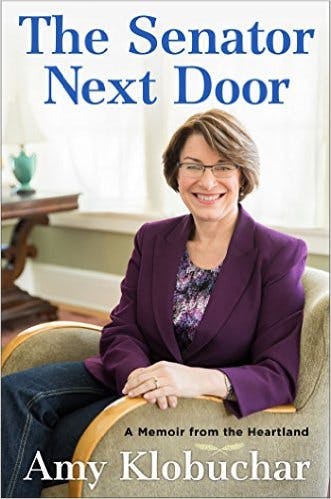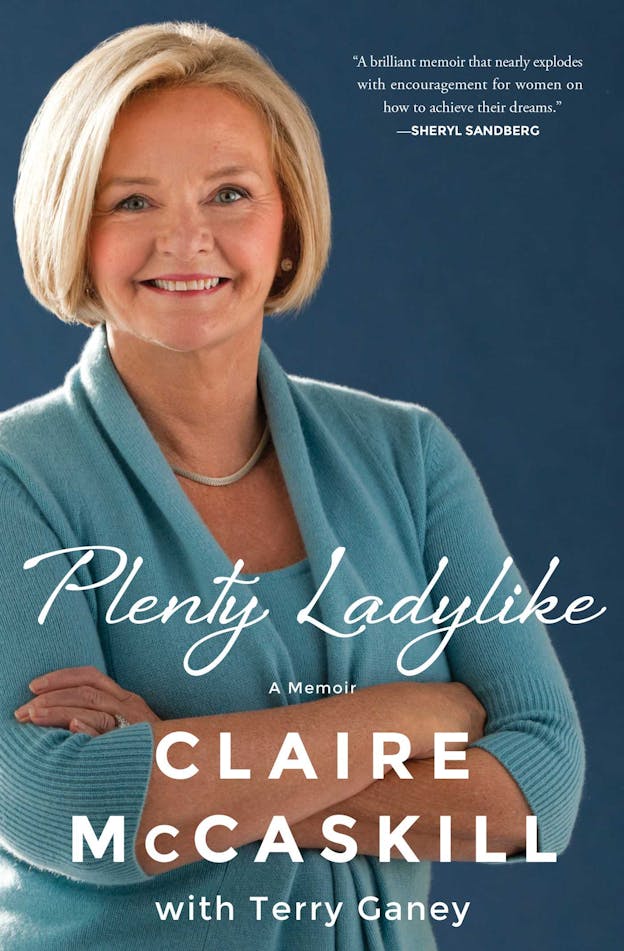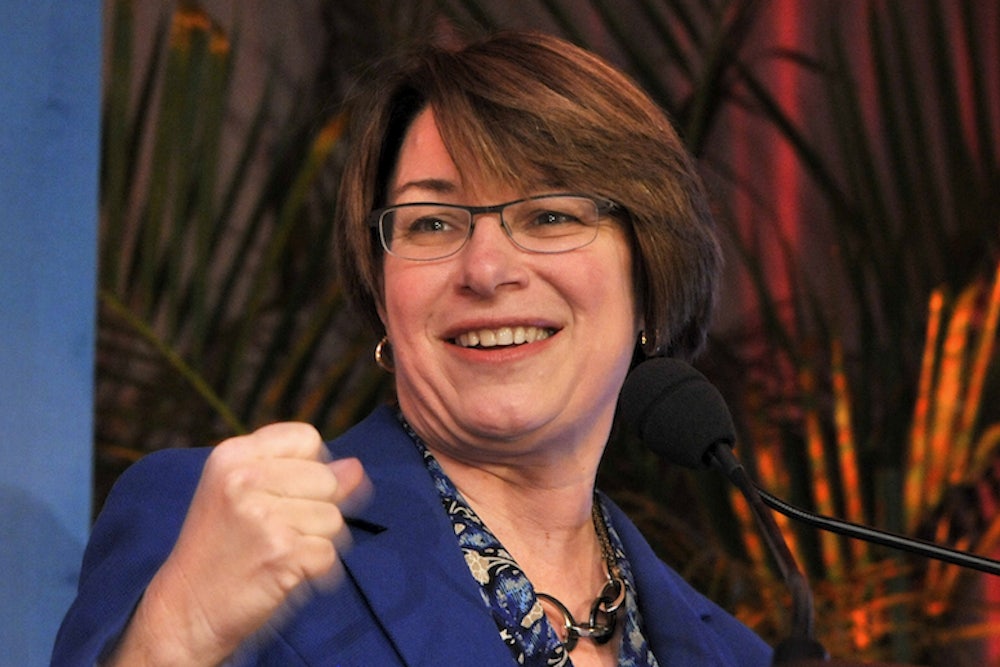This month, Sheryl Sandberg gave her stamp of approval to two memoirs written by female politicians: blurbing both Plenty Ladylike by Senator Claire McCaskill of Missouri, and The Senator Next Door by Minnesota Senator Amy Klobuchar. "Her story radiates with warmth, humor, and candor,” Sandberg writes of Klobuchar. “I hope it will inspire women everywhere to take part not only in public life, but in all endeavors in their lives, with the same passion." Her endorsement of McCaskill's book is equally enthusiastic: "a brilliant memoir that nearly explodes with encouragement for women on how to achieve their dreams." Yet these memoirs couldn’t illustrate more clearly the very different approaches these politicians have taken when discussing their political formations, ambitions, values and, how these are entangled with the thorny issue of sexism in American politics.


Of the two, McCaskill’s book is by far the more conventional, the latest in a long line of memoirs that recount many experiences of sexism over the course of a nonetheless successful career. Plenty Ladylike’s similarities with California senator Barbara Boxer’s memoir, published over twenty years earlier, in 1994, are striking. Entitled Strangers in the Senate, Boxer’s book outlined her bid for county supervisor in California in 1971. She wrote that those first years in office were “a masochistic experience, a series of setbacks without a lot of rewards.” On the campaign trail one voter asked: “So tell me, Barbara, when do you have time to do your dishes?” “There were days when I thought I had broken through,” Boxer wrote, “days when no one asked me how old my children were or what my husband thought of my candidacy. But then the prejudice would return.”
In much the same way, Plenty Ladylike shows McCaskill “surviving sexist slings.” It begins with McCaskill knocking on doors during her first race for state representative. One night she walks up to a smallhouse in a modest neighborhood. Greeted at the door by an older man, she launches into her speech. “Hullo. I’m Claire McCaskill, and I’m an assistant prosecutor. I’m running for state prosecutor, and I’d appreciate your vote.” He looks her up and down and replies: “You’re too young. Your hair is too long. You’re a girl… Go find yourself a husband.” She writes that after being elected to the Missouri General Assembly, “it wasn’t unusual for even my married colleagues to sidle up to me and make suggestive comments.” As recently as last year, McCaskill writes, Janet Yellen was called out for wearing the same outfit twice, and NPR told its listeners that Kirsten Gillibrand had a “soft, girlie voice.” Many of her points are well taken. Sharing such stories has long been the first step towards identifying the sources of sexism, organizing, and combatting them.
Although her mission is a worthy one, the book sometimes flails in its execution. We might expect some element of intimacy of disarming frankness from a memoir, but this book reads as though it was ghostwritten. McCaskill’s often predictable anecdotes about overcoming sexism largely carry the narrative. There are sparks of personality, including a terrific anecdote about how McCaskill celebrated her victory over Todd Akin. “My daughters had to show me how to shotgun a beer,” she writes. “Beer gushes into your mouth and you have to swallow quickly to avoid a big mess. I did it. And we laughed until we cried.” But such moments are rare.
Klobuchar’s memoir, on the other hand, reflects a change in the attitudes of many women towards the sexism they may or may not encounter in their professional lives—an approach much closer to Sandberg’s own. Speaking to an audience of women in Silicon Valley, last year, Sandberg argued that “much too much of the conversation is on blaming others, and not enough is on taking responsibility ourselves.” Her message, elaborated in her bestselling book Lean In, is that women should actively pursue equality, by making demands that are more commonly made by their male counterparts: asking for a raise, negotiating better terms of employment, stepping into leadership roles. Ken Auletta at the New Yorker paraphrased her speech: “We could swap anecdotes about sexist acts. But doing so diverts women from self-improvement.”
Klobuchar has long shared this outlook. The day after she won her first senate campaign in 2006, becoming the first woman senator from Minnesota, a reporter for the Minneapolis Star Tribune wrote that Klobuchar “had never highlighted gender” in the race. Indeed, Klobuchar herself has said that she “had decided to downplay gender right from the start.” “We spend a lot of time talking about and batting down sexist comments or stereotypes,” Klobuchar proposes in The Senator Next Door. “But to truly move forward, we need to sell the successes of women in power.”
In the memoir, she talks about the events and people that shaped her political beliefs, with some disarmingly funny and honest asides. Her grandparents, she writes, were immigrants from Slovenia and Switzerland, seeking new opportunities in America. In writing the book, she had to look up dates when her grandparents were married and parents born, only to find that both her parents were born less than nine months after their parents married. “Nothing like doing a little research only to find out that not one but both of your parents were conceived before marriage!” she quips. She watched her parents—her mother a schoolteacher, her father a newspaperman—economize make ends meet throughout her childhood. She took out thousands of dollars in student loans to pay her way through Yale. She would later use those experiences to articulate her political ideology on the campaign trail. She hews to a narrative about overcoming economic adversity—which speaks to her positions on reforming health care and fighting for the middle class, for instance—rather than overcoming sexism.
At the same time Klobuchar does discuss her experiences as a woman juggling the responsibilities of family and a career. She talks about wishing she could spend more time at home with her daughter. Once, racing to make a vote on the Senate floor, her phone began buzzing, she writes, “in a maddeningly ‘don’t forget your family’ way.” She ended up was mediating a heated debate over the phone with her husband and daughter about “the crucial difference between a bikini and a tankini.” Racing to make it to the vote, she ran smack into Lindsey Graham. Those stories are part and parcel, she says, of being a working mother. She later says that it could be disheartening calling a list of donors only to be refused by a man, whom, she could see, had previously donated to male politicians. But she leaves it at that, and does not suggest that prejudice would hold her back.
Klobuchar’s book doesn’t only reflect the increasingly popular philosophy of female executives, tired of complaining about the glass ceiling and strategizing instead how to break it. It also reflects both the gains of women in politics in recent decades, and the evolving strategies women politicians are now embracing to build on those gains. Polls show that 92 percent of Americans would welcome a female president. Political scientists such as Deborah Jane Brooks and Jennifer Lawless have shown that certain negative gender stereotypes have become far less pervasive on the campaign trail, as more women have entered politics over the last few decades. Women who act tough, who cry, or who succumb to angry outbursts, Brooks finds, are not penalized any more than a male candidate would be for the same behavior. Although the playing field is far from level, conditions are better than they have ever been before.
These shifts, however, don’t solve the problem of how women in power should talk about their experiences of sexism and the difficulties they’ve met with in their careers because of it. In fact, they create a new challenge. Last year Rebecca Traister wrote that we are “bursting with ideas about how to normalize the concept of women in power, but still constrained by a system that politically, economically, and culturally remains dominated by white men.” We still have to yet arrive at a point when women can run for office without acquiring the tag of “The Woman Candidate,” she wrote. Although McCaskill’s book and others like it are powerful testaments to sexism, to get closer to equality, we need more politicians like Klobuchar—who can tell their stories energetically and with humor, presenting themselves as dynamic public figures, rather than boxing themselves into “The Woman Candidate” category.
